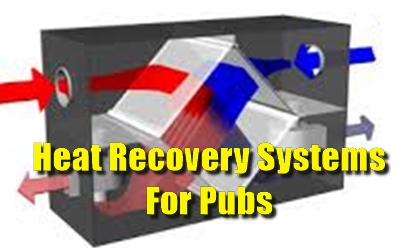Energy costs are probably one of the highest overheads of any business, none more so than in pubs and, as a manager, you should ensure that you have the right energy contract and minimise your utility costs. You can find more advice on this website by reading my articles on Controlling Utility Costs, Reducing Cooling Costs and Energy Contracts.
If you are prepared to undertake an energy efficiency and energy saving policy throughout your pub you will find the positive difference to your bottom line quite worth the while.
The trouble is that two of the major users of energy in your premises will be the cellar cooling and the hot water boiler, neither of which can be dispensed with. Most pubs and bars across the country are, in effect, paying twice for their energy, because some operations involve heating things up – like water for heating and catering, while others involve cooling things down, specifically beer in the keg/cask/bottle store.
So what if there was a combined system that effectively cooled your cellar to the correct temperature and as a by-product gave you oodles of “free” hot water?
A refrigeration heat recovery system replaces the water boiler and cellar cooling with one combined system using the heat from the cooling operation to heat water, with many associated benefits.
One company, GeoBAR, who install these systems reports that customers are saving over £4,000 on average on their energy bills, as well as seeing a substantial reduction in CO2 emissions, averaging around twenty six tonnes a year. It saves the heat generated from cellar cooling instead of dumping it outside. So it’s a “win win” situation as it’s good for the environment and great for keeping pub bills to a minimum.
Other Benefits
The wider benefits of a refrigeration heat recovery installation are:
- Replaces the hot water boiler, saving on replacement cost and servicing.
- The refrigeration heat recovery heat pump is much quieter than traditional external cellar cooling units, greatly reducing noise to neighbours. They can also be fitted internally, relieving planning restrictions or freeing up much needed exterior space.
- Heat can be recycled from line coolers and white goods (such as fridges and freezers, leading to more efficient working temperatures and fewer equipment breakdowns.
- A reduction of 25-30 Tonnes of CO2 per outlet every year, reducing CRC costs by permanently reducing the carbon footprint.
- Improved cellar cooling resolves temperature related drinks quality problems.
- Because the refrigeration heat recovery system uses significantly less refrigeration gas, there is no legal requirement to have the system inspected and certified annually, although it will still need to be serviced regularly and require electrical testing from time to time.
- Line coolers could be moved, shorter beer lines may save beer waste of up to £2,000 per year.
- Increased Energy Performance Certificate rating, making your business more attractive to potential buyers.
Do the maths, if a system costs even £12,000, the combined savings of energy costs and reduced beer wastage could mean this capital outlay would be repaid in two years, and then your business could, potentially, be better off by £6,000 a year as you go forward.
A refrigeration heat recovery system works best when a pub has a high hot water demand, but as it reduces heat build up it is often put in outer cellars to cool line coolers.
People are generally not familiar with the fact that research has shown that refrigeration equipment uses about 3 times as much energy when operating at above 30º C (outer cellar in many pubs in summer) than at 11ºC (cellar temperature) so satisfying consumer demand for chilled beers during the summer just exacerbates the situation, sometimes to the point where a traditional cellar cooling system simply cannot keep the cellar to the required temperature.
These systems are not cheap, so the decision to install is not to be taken lightly. Ideally the replacement of a hot water boiler and cellar cooling system with a refrigeration heat recovery system should be considered when the cellar cooling equipment needs replacement or when the hot water/heating system needs replacement.
Fortunately for those looking to undertake this major capital outlay there are interest free loans available via the Carbon Trust for small businesses in Wales and Northern Ireland which you can find out at about at the Carbon Trust website . Along with advice on energy saving explanations (including some really neat animated examples of how refrigeration heat recovery systems work).
Continue reading … page 2
